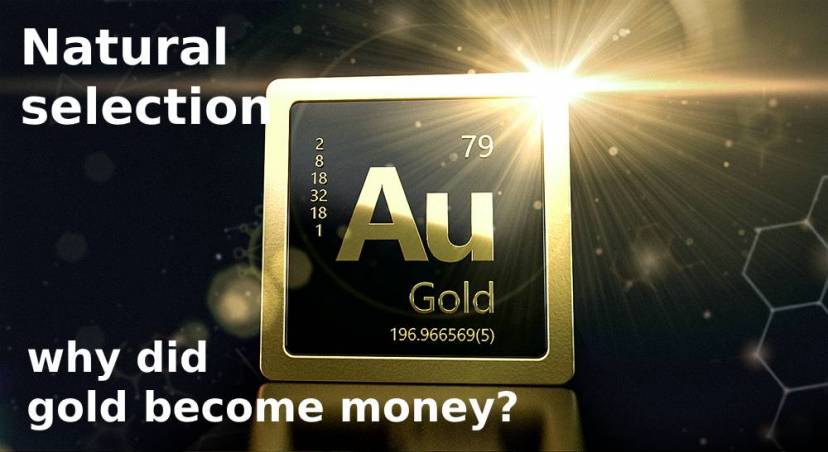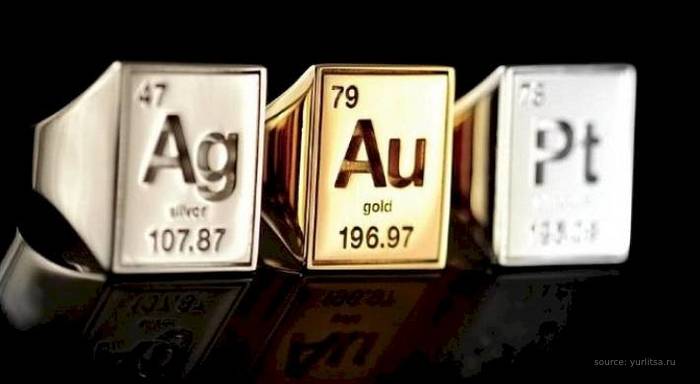Natural selection: why did gold become money?

Gold is a legendary metal that occupies a special place in the history of mankind. For thousands of years, the yellow metal has served people as money and to this day it remains the most important tool of the financial system.
But why gold? Is there really nothing more suitable for the role of money in the periodic table of 118 elements?
Let's figure out why gold stands out against the background of other chemical elements.
Gases and liquids
Examples: argon, helium, mercury, bromine. It is very hard to utilize something that does not have a specific shape and changes its properties depending on temperature, pressure and other circumstances as money.
Lanthanides and actinides
Examples: cerium, thorium, uranium. As a rule, these elements decompose and become radioactive. If you carry them in your pocket, you can get poisoned or receive a dose of radiation.
Alkali and alkaline earth metals
Examples: lithium, sodium, magnesium, calcium. They are highly reactive and very sensitive to environmental influences. Some may even spontaneously ignite.
Rare-earth elements (REE)
Examples: scandium, yttrium, samarium. Rare-earth elements, as their name implies, are extremely rare in the earth's crust. This makes it impossible to widely use them as a medium of payment.
Synthetic elements
Examples: rutherfordium, nihonium. All are created artificially in laboratories. For this reason, such elements could not be used as cash payments in the past.
Transition, post-transition metals and semimetals
Examples: gold, silver, copper, nickel, aluminum. We finally got to the elements that are suitable for the role of money. For a metal to become an ideal monetary unit, it must be rare, but not too rare. For this reason, for example, copper and nickel, which are aplenty on Earth, are no good.

Top 5
As a result of the selection process, only five precious metals remain: platinum, palladium, rhodium, silver and gold.
Rhodium and palladium were discovered by people relatively recently (in 1803), so the history of their use is very short.
Silver was used as money for a long time, yet a major flaw was found — silver darkens over time.
So, what do we have then? Platinum and gold. The melting of platinum requires an extremely high temperature, the maintenance of which entails a lot of work and resources. In contrast, gold melts at a lower temperature. The yellow metal is malleable and easy to process. Therefore, the people’s choice is rather obvious.
Conclusion
Gold does not evaporate, does not burn, is not toxic, and won’t irradiate its owner. Gold is quite rare, and there can never be too much of it. It is easy to make coins and bars from it, which today are no less in demand than hundreds of years ago. In the digital age, when savings may vanish with just one click, gold becomes especially compelling. It is an eternal value that has existed and will always exist. That's why millions of people use gold as a Financial Security tool to protect their savings from the crisis and the collapse of the banking system.


![[VIDEO] Young investors choose gold
[VIDEO] Young investors choose gold](https://f01.gig-os.com/74/2c/cc/2b/74/742ccc2b74d465054d6aed797b9de6a1_5.jpg?1)
![[VIDEO] The US legalizes payments in gold [VIDEO] The US legalizes payments in gold](https://f01.gig-os.com/cf/b1/ba/70/55/cfb1ba7055dd2524218f5aabd01efea8_5.webp?1)
![[VIDEO] Record gold demand: market situation in Q1 2025
[VIDEO] Record gold demand: market situation in Q1 2025](https://f01.gig-os.com/0d/85/47/0b/15/0d85470b15a79bc2aabf122c0d401060_5.webp?1)
![[VIDEO] Investors in Asia are buying up gold!
[VIDEO] Investors in Asia are buying up gold!](https://f01.gig-os.com/45/45/84/6f/73/4545846f738945417567ffd2f6f163bb_5.webp?1)
![[VIDEO] Gold price has increased 9 times since the early 2000s!
[VIDEO] Gold price has increased 9 times since the early 2000s!](https://f01.gig-os.com/47/af/07/eb/bb/47af07ebbb01542f14c0aae36a81f1c0_5.webp?1)
![[VIDEO] The US is urgently increasing gold mining — what’s going on? [VIDEO] The US is urgently increasing gold mining — what’s going on?](https://f01.gig-os.com/43/06/89/4d/da/4306894dda97c98b6e595409af58b694_5.webp?1)
![[VIDEO] China sets trends in the global gold market
[VIDEO] China sets trends in the global gold market](https://f01.gig-os.com/5b/81/78/92/92/5b81789292d5e49f20ca7ca093a27cbe_5.jpg?1)
![[VIDEO] Central banks acquired a quarter of the world's gold!
[VIDEO] Central banks acquired a quarter of the world's gold!](https://f01.gig-os.com/81/2d/76/ff/b0/812d76ffb00ee75856059a67a872642c_5.webp?1)
![[VIDEO] Gold: new records amid market volatility
[VIDEO] Gold: new records amid market volatility](https://f01.gig-os.com/03/8b/98/61/b7/038b9861b74be1ae5d57e56e2d2dc859_5.webp?1)